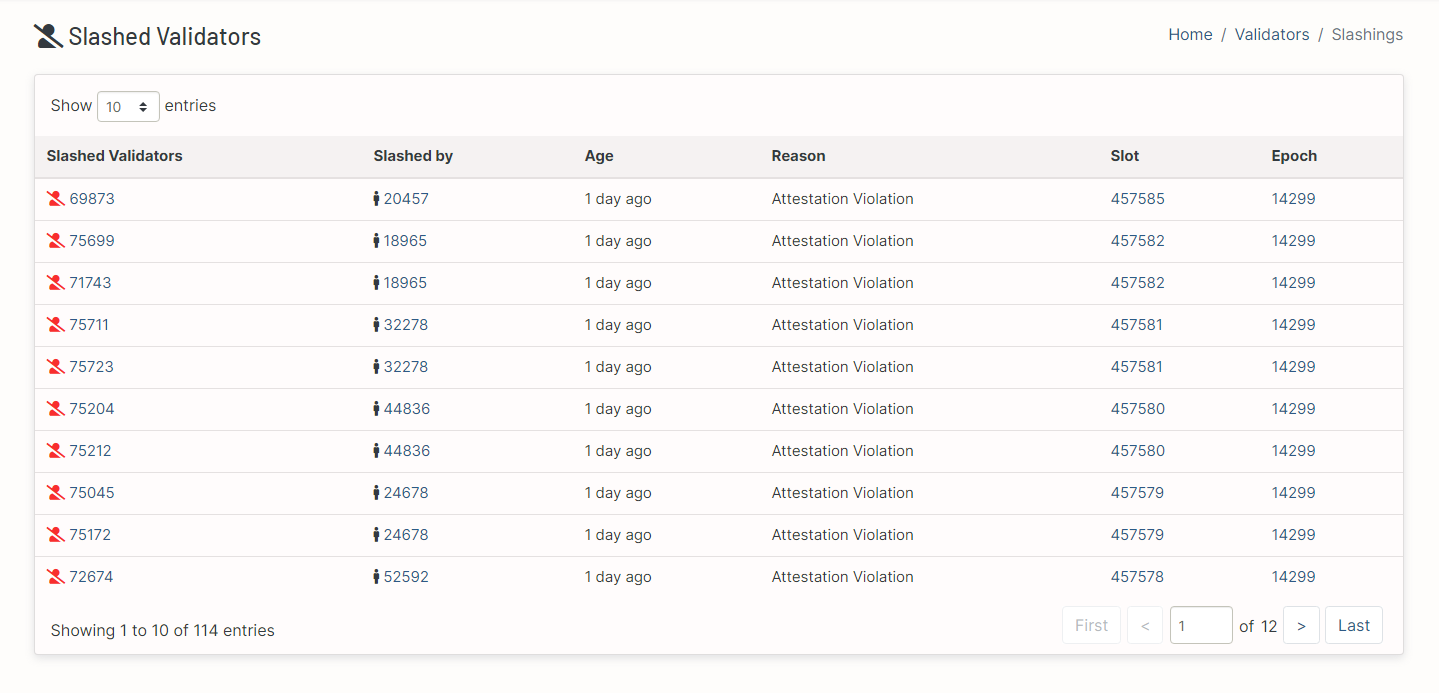75 ETH 2.0 Validators Double Vote, Lose $30,000 to Penalties
3 min readStaked.us, an Ethereum 2.0 (ETH) staking service provider, was hit with a $30,000 penalty for accidentally double voting on the network.
On February 2, 2021, at least 75 nodes were heavily penalized on the Ethereum 2.0 network. Data from BeaconCha.in, a website dedicated to tracking the ETH 2.0 mainnet, reveals that all affected nodes were ‘slashed’ within minutes of each other.

In Ethereum, slashing refers to the process of economically punishing nodes for performing malicious actions. In this case, the slashing was triggered by double voting or running the staking software on two computers simultaneously.
The slashed validators reportedly belonged to staking service provider Staked.us. Via a blog post, CEO Tim Ogilvie admitted that the company had introduced additional risk by chasing performance gains. Staked.us had also disabled certain safeguards in this pursuit of maximizing hardware performance, further compounding the problem.
The entire ordeal cost the company approximately 18 ETH or $30,000 at current prices. However, Staked.us has since acknowledged that it will be absorbing the cost of the incident. In other words, the firm’s clients will not have to deal with either the penalties or missed income opportunity.
How Ethereum 2.0 Penalizes Malicious Nodes to Keep Them Honest
By participating in the staking process, Ethereum 2.0 validators pledge to uphold the rules of the network. Any activity that breaks them, or is deemed malicious by other honest users, is flagged by other nodes. The node owner is then penalized financially (slashed).
Each validator needs to stake 32 ETH to participate in the transaction verification process. Violations can cause penalties of up to 50% of this amount. Penalized nodes can continue participating as long as their balance stays above 16 ETH. Once this level is reached, the node is automatically ejected from the network.
This rule ensures that transaction validation can take place in a majority honest way. To successfully attack the network, a majority of validators would have to collude.
Some argue this is more difficult than a 51% attack in Proof-of-Work cryptocurrencies like Bitcoin (BTC) and even Ethereum 1.0. Instead of the hash rate, an Ethereum 2.0 attacker needs to control over half of all staked coins.
While attackers could rent computational power from services such as Nicehash, owning 51% of all staked coins is virtually impossible. The attack becomes even more difficult as the PoS network grows and attracts new stakers over time.
All of the above factors likely make attacks on the Ethereum 2.0 network fairly difficult to pull off. The 75 nodes were each penalized approximately 0.2–0.3 ETH. At a much larger scale, these penalties would require attackers to risk millions of dollars.
Mistaken Slashings: Growing Pains
On Dec. 1, 2020 Phase 0 of the ETH 2.0 network launched. Over the past two months, hundreds of validators have already been slashed. While some were likely genuine attacks, others could simply be a result of inexperience.
As with any new technology, early adopters are likely the most vulnerable to losses. As ETH 2.0 marches on, these incidents will likely serve as valuable cautionary tales to new validators.
The post 75 ETH 2.0 Validators Double Vote, Lose $30,000 to Penalties appeared first on BeInCrypto.





![Decentraland: Review & Beginner's Guide [current_date format=Y] 20 Decentraland: Review & Beginner's Guide](https://cryptheory.org/wp-content/uploads/2020/11/decentraland-02-gID_7-300x150.jpg)